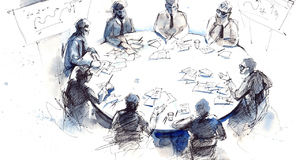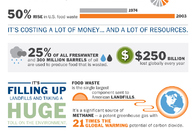Student VoicesEquitable Capitalism: The Rebirth of American Business
By
2009, Vol. 1 No. 11 | pg. 1/1
KEYWORDS:
My love for business began as I read Ayn Rand’s acclaimed novel, Atlas Shrugged, in the ninth grade. Packed with adventure, danger, and optimism about our country’s fundamental views on commerce, Atlas Shrugged instilled much of my initiative and focus towards becoming a businessman. However, the most important lesson I learned from this book was a simple one, the one upon which American fundamentals rest: the beauty of business is that it is a voluntary transaction between two parties that results in mutual benefit for both parties. This is a profound idea; a nation of people could work together to better themselves and all others by engaging in fair, competitive trade. This idea has been tried and tested for nearly three centuries and has experienced periods of success and failure, adapting to changing social conditions and markets. Again, this idea is under scrutiny due to the financial and economic crisis that has occurred in our nation and throughout the rest of the world.The events concerning the American financial system that transpired throughout 2007, 2008 and early 2009 have left many in poverty and have drawn critics from the liberal and conservative reservoirs of our country to assert both ideas of drastic, government based change and static, laissez-faire policies. However, while government policies may or may not lead our country to a new time of prosperity, there is an issue at stake which is vastly more important, and an issue which can no longer be ignored: American businessmen and women have lost sight of mutual interest in business. Our country drips with evidence of individual greed consuming the hearts and minds of the American business-class. Companies such as AIG, Merrill-Lynch, Lehman Brothers, and even individuals like Bernard Madoff and Sir Allen Stanford, have become the figureheads of the demise of American capitalism as a result of greed. The effects of this greed have caused a rift to form, dividing Wall Street from Main Street, further dividing Republicans from Democrats, and rotting the ability of our nation to stand as a symbol of prosperity and progress. In understanding the inherent greed in our current economy, it is essential to first digress and differentiate greed and desire. Desire, the act of wishing for, longing for, or craving something is the force that should be driving American business. The desire for modest personal luxuries, better standard of living, better education, and better relations pushes individuals to work harder, better, and more efficiently. It is in this desire that Americans should invest into and this desire which can provide a responsible network of business throughout our nation and the world. Not to be confused with this is greed, which is the perversion of desire; a case where individuals crave for more than they have earned, more than they can consume, and often seek to obtain these results by any method necessary. Such is the case with much of American business. The desire to earn and receive proportionate and just profits has been cast into a dark corner of the American marketplace and the swinish face of greed has been allowed to dominate, pulling American business into a grim period. Examples of this greed relating to our current economic situation are everywhere: the adjustable rate mortgages that many banks were all too willing to hand out, even to unqualified and irresponsible buyers; the collateralized debt obligations (many of which were heavily comprised of the risky mortgages mentioned earlier) that banks were quick to sell to investors; the credit default swaps, much like insurance for these packaged collateralized debt obligations, that companies such as AIG were ready to capitalize upon. These incidents point out that it is an issue of mentality that lies at the heart of the financial downturn. Investors, ready to make exorbitant profits, bought the high-risk CDOs. Banks, ready to make money of investments they knew to be extremely risky, sold the CDOs. Insurance companies, wanting to squeeze a penny from any orifice they could, insured CDOs at the expense of their customers. Who is to blame? Those whose greed for more money resulted in irresponsible transactions, a label which encompasses a large portion of our business leaders. The truly remarkable idea that America supports a more or less free economic system is a blessing and a curse; it allows for Americans to responsibly grow business, as well as allowing businesses and individuals to take advantage of limited government involvement to satisfy the porcine hunger of greed. Americans, in general, have acquired a black and white view towards this issue. Many denounce the pursuit of wealth, success, and materialistic luxuries all together, viewing those qualities with contempt. In contrast, many Americans have become obsessed with wealth, success, and materialistic luxuries, to such extent that they are eager to take advantage of others to accomplish their aims. What is in short supply, however, among Americans today is a compromised view that the pursuit of money is good to an extent, and that extent is when others are taken advantage of. The synergy of profit maximization with social benefit is an idea which is more powerful than even the wealthiest corporations or investors on Wall Street and is the key to the continued success and prosperity for America. Profits are good; investors and businesses should be highly encouraged to maximize profits, though doing so at a margin that does not take advantage of consumers. In a recent financial scandal, multiple companies which received bailout funds from the government used much of the granted money to pay excessively high bonuses to employees, as the bonuses were necessary to retain high value employees. This incident displays exactly what is at the heart of our economic dilemma: businessmen and women would rather take in more money than do what is morally and socially right. The constant inculcation of ROI and big, fat paychecks has disillusioned those who have a responsibility to provide honest good or service for a reasonable profit. Throughout the business schools and corporations of our country, ambient chants of “profit, profit, profit” are ever burning a message into future business leaders: make the most by any means necessary. A change is needed: it is time for our nation to act in uniform and understand that responsible business is more important than short-term gain. As a result of the recent actions taken by the government, many Americans and citizens of the world have come to believe that America has finally conceded to socialism, that capitalism has had its run, and that a new age has dawned for America. The socialist government policies are short-term, capitalism has not died, however the world is about to experience a new age of America: an age of responsibility and social mindfulness, the rise of equitable capitalism. Suggested Reading from Inquiries Journal
Inquiries Journal provides undergraduate and graduate students around the world a platform for the wide dissemination of academic work over a range of core disciplines. Representing the work of students from hundreds of institutions around the globe, Inquiries Journal's large database of academic articles is completely free. Learn more | Blog | Submit Latest in Opinion |














